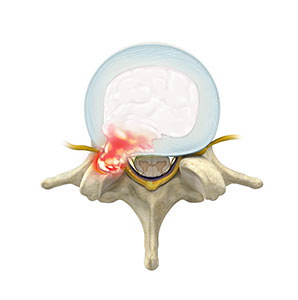Herniated Disc

The bones in the spinal column called vertebrae surround the spinal cord and other nerves, and are cushioned by soft inter-vertebral discs that act as shock absorbers for the spine. The inter-vertebral discs are composed of a jelly-like nucleus pulposus at the center, surrounded by a fibrous ring called the annulus fibrosus. A herniated disc is a condition in which the outer fibrous annulus of the inter-vertebral disc is damaged, causing the nucleus to protrude through the ruptured annulus and compress the adjacent nerve root and/or spinal canal. A herniated disc is also known as a slipped disc or a ruptured disc. Wear and tear due to ageing, repetitive strenuous movements, smoking, improper lifting and being overweight may alter the structure and function of these discs.
What are the symptoms of a herniated disc?
The predominant symptom of a herniated disc is pain, which can range from mild to severe and is usually aggravated by movement. The most common signs and symptoms of a herniated disc are as follows:
- Herniated disc in the lower back causes back pain that radiates to the buttocks and legs.
- Herniated disc in the neck causes neck pain that radiates to the shoulders and upper arms.
- Numbness or tingling sensation
- Muscle weakness
- Occasionally, bowel and bladder dysfunction
How is a herniated disc diagnosed?
An accurate diagnosis and an effective treatment plan are important for a successful outcome. Your doctor will usually diagnose a herniated disc based on your history of symptoms along with a physical examination, where your sensations, reflexes and the strength of the muscles are evaluated. Imaging tests such as X-rays, MRI or CT scans or electromyography (measures nerve signals to muscles) may be ordered to confirm the diagnosis of a herniated disc.
What are the treatment options?
Conservative treatment may include rest, anti-inflammatory and pain medications, muscle relaxants, cold or hot compresses, activity and posture modifications, physical therapy, spinal injections, electrical stimulation, traction or braces. Your doctor may recommend a combination of two or more treatment modalities to enhance the potential of success of the treatment.
Surgery is not always indicated as a first-line treatment for herniated disc, unless severe neurologic dysfunction, or failure of conservative treatment results.
Your Physician will discuss the most appropriate option for you at your visit.
